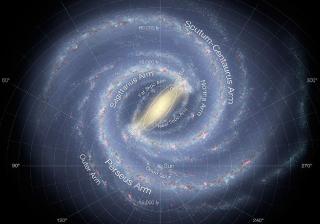Bibcode
López-Corredoira, M.; Lee, Y.-W.; Garzón, F.; Lim, D.
Bibliographical reference
Astronomy and Astrophysics, Volume 627, id.A3, 5 pp.
Advertised on:
7
2019
Journal
Citations
10
Refereed citations
9
Description
Context. Claims of an X-shaped Galactic bulge were based on the
assumption of red clump stars as standard candles in some lines of sight
crossing the off-plane bulge. However, some doubts have been cast on
whether the two peaks in star counts along the line of sight really
represent a double peak in the density distribution, or whether there is
something wrong with the assumption of a unique constant absolute
magnitude for all of these stars. Aims: With the advent of
Gaia-DR2 parallaxes in combination with near-infrared VISTA-VVV data, we
are able to check which of the hypotheses is correct. Methods: We
calculated the median absolute magnitude MK corresponding to
both peaks of putative red clumps in seven lines of sight with the
lowest extinction in the interesting coordinates' range. Results:
The difference between the absolute magnitude of the bright and the
faint peak is ΔMK ≈ 0.4. The selected stars in both
peaks cannot be represented by the same red clump giants with constant
MK ≈ -1.6. Conclusions: The hypothesis that the
bulge contains an X-shape is based on the assumption that the faint and
bright peaks of the density distribution towards the bulge are dominated
by standard red clump stars. However, we show that both the faint and
bright peaks cannot be dominated by standard red clump stars
simultaneously.
Related projects

Morphology and dynamics of the Milky Way
This project consists of two parts, each differentiated but both complementary: morphology and dynamics. Detailed study of the morphology of the Milky Way pretends to provide a data base for the stellar distribution in the most remote and heavily obscured regions of our Galaxy, through the development of semiempirical models based on the
Martín
López Corredoira